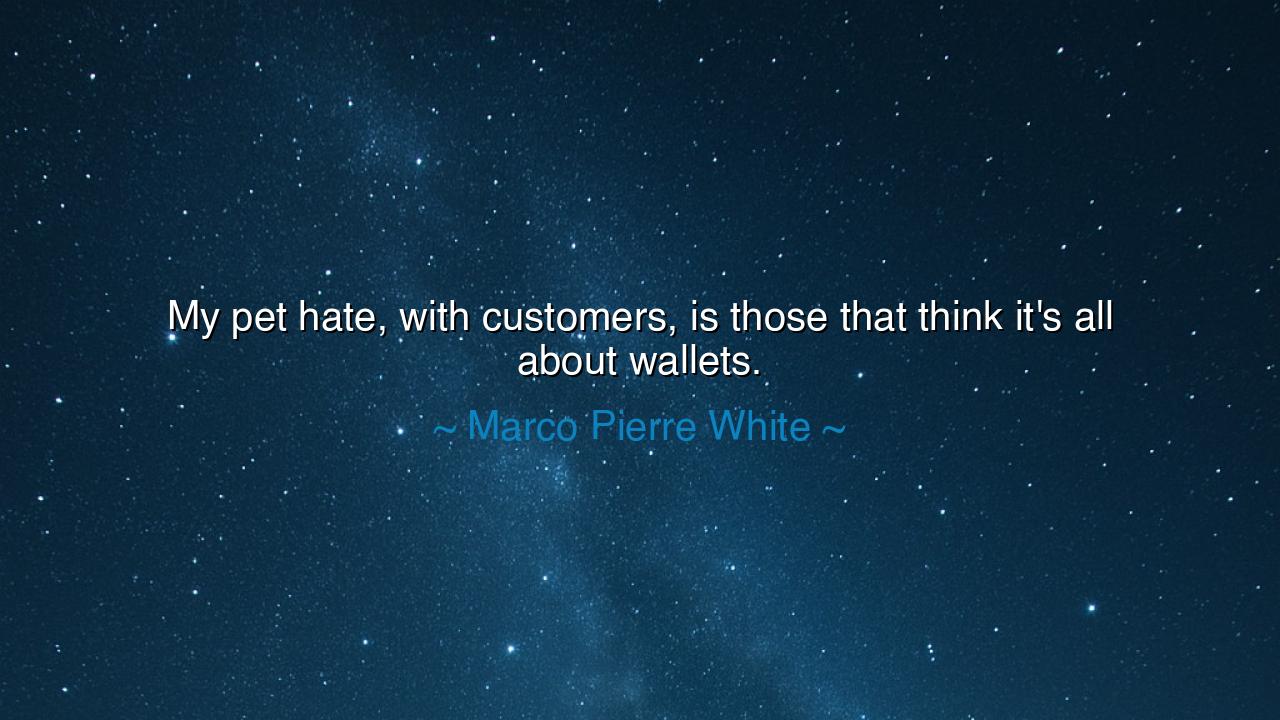
My pet hate, with customers, is those that think it's all about






Hear, O seeker of wisdom, the words of Marco Pierre White, who declared: “My pet hate, with customers, is those that think it’s all about wallets.” These words, forged in the fiery kitchens of one of the world’s great chefs, are not simply the complaint of a craftsman, but a cry for reverence, for truth, and for the recognition of art beyond mere coin. For in them is contained the timeless lesson: that not all value can be measured by gold, and that when men reduce beauty to commerce, they strip it of its soul.
The wallet, in this saying, is not only the purse of money but a symbol of shallow judgment—the belief that the worth of a dish, a work, or even a man himself is found only in the price. Such thinking has haunted every age. In Rome, the poet Horace lamented that his verses were judged by the coin they earned, not by the wisdom they contained. In the Renaissance, artists often suffered under patrons who saw only profit and prestige, not the spirit poured into the canvas. And now, in Marco’s lament, we hear the same truth: that the sacred labor of a chef, the harmony of flavors, the beauty of creation, cannot be weighed like merchandise in a market stall.
Consider the life of Vincent van Gogh, who painted with fire in his soul yet sold almost nothing while alive. If judged by wallets, his work was worthless; but judged by the spirit, it was immeasurable. The world, blinded then, later awoke to his genius. So too with Marco’s words: the customer who measures only by cost is blind to the deeper worth of craft—the years of discipline, the scars of labor, the passion of creation.
The ancients taught that true appreciation requires humility. When a traveler entered a temple, he did not ask how much the stones had cost, but marveled at the hands that raised them and the gods they honored. When a guest is served at a table, the wise response is not to weigh the price of the plate, but to honor the heart of the host. Marco, in his words, calls us back to this ancient reverence: that the chef’s table is not a marketplace but a temple, where food is offered as creation, not commodity.
Yet there is also justice in his lament, for he speaks not only for himself but for all who labor in craft, in art, in teaching, in service. Too often, their works are reduced to numbers, their souls to transactions. To despise this reduction is not arrogance but truth. For if everything is judged by the wallet, then nothing noble can survive, and the sacred fire of artistry will wither beneath the weight of greed.
O listener, take this lesson deep into your heart: when you encounter the works of others—be it food, music, painting, or labor—do not measure first by price, but by spirit. Ask not only, “What does it cost?” but “What does it mean? What does it give? What soul lies behind it?” In this way, you will learn to honor the unseen, and your appreciation will become worship rather than transaction.
Practical wisdom follows: the next time you sit at a table, pause before you calculate the bill. Taste with gratitude, reflect on the hands that labored, the years of discipline hidden in the dish. When you receive art, or teaching, or service, honor the giver more than the cost. Let your wallet not be the measure of your respect, but your reverence and your recognition of human spirit.
Thus I say to you: heed Marco Pierre White’s words. For they are not the anger of a chef, but the lament of all creators. To think life is all about wallets is to walk in blindness; to see beyond coin is to walk in wisdom. And those who learn this will not only honor the crafts of others but will themselves live lives worthy of honor.






AAdministratorAdministrator
Welcome, honored guests. Please leave a comment, we will respond soon